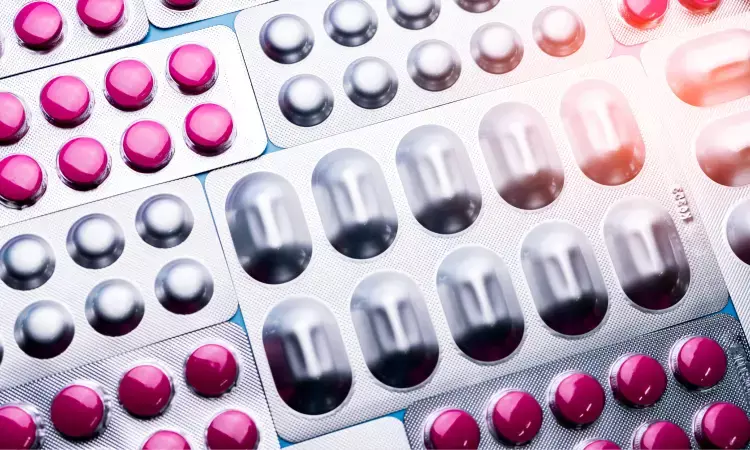- Home
- Medical news & Guidelines
- Anesthesiology
- Cardiology and CTVS
- Critical Care
- Dentistry
- Dermatology
- Diabetes and Endocrinology
- ENT
- Gastroenterology
- Medicine
- Nephrology
- Neurology
- Obstretics-Gynaecology
- Oncology
- Ophthalmology
- Orthopaedics
- Pediatrics-Neonatology
- Psychiatry
- Pulmonology
- Radiology
- Surgery
- Urology
- Laboratory Medicine
- Diet
- Nursing
- Paramedical
- Physiotherapy
- Health news
- Fact Check
- Bone Health Fact Check
- Brain Health Fact Check
- Cancer Related Fact Check
- Child Care Fact Check
- Dental and oral health fact check
- Diabetes and metabolic health fact check
- Diet and Nutrition Fact Check
- Eye and ENT Care Fact Check
- Fitness fact check
- Gut health fact check
- Heart health fact check
- Kidney health fact check
- Medical education fact check
- Men's health fact check
- Respiratory fact check
- Skin and hair care fact check
- Vaccine and Immunization fact check
- Women's health fact check
- AYUSH
- State News
- Andaman and Nicobar Islands
- Andhra Pradesh
- Arunachal Pradesh
- Assam
- Bihar
- Chandigarh
- Chattisgarh
- Dadra and Nagar Haveli
- Daman and Diu
- Delhi
- Goa
- Gujarat
- Haryana
- Himachal Pradesh
- Jammu & Kashmir
- Jharkhand
- Karnataka
- Kerala
- Ladakh
- Lakshadweep
- Madhya Pradesh
- Maharashtra
- Manipur
- Meghalaya
- Mizoram
- Nagaland
- Odisha
- Puducherry
- Punjab
- Rajasthan
- Sikkim
- Tamil Nadu
- Telangana
- Tripura
- Uttar Pradesh
- Uttrakhand
- West Bengal
- Medical Education
- Industry
Ketorolac safe perioperative analgesic in children undergoing hypospadias repair

USA: A study published in the Journal of Pediatric Urology has concluded that ketorolac use is not associated with increased unplanned encounters in children undergoing hypospadias repair. The researchers mentioned it as a safe agent for perioperative analgesia, decreasing opioid utilization.
The opioid crisis has raised concerns regarding the long-term sequela of routinely administrating opioids in paediatric patients. NSAIDs (Nonsteroidal Anti-Inflammatory Drugs) have limited use in hypospadias surgery because of the potential risk of postoperative bleeding with ketorolac.
Researchers hypothesized that administrating ketorolac at the time of hypospadias repair is not tied to increased bleeding or immediate adverse events.
The study summary includes the following:
- Researchers included patients undergoing hypospadias surgery (2018-2021).
- Outcomes included perioperative ketorolac administration, opioid prescriptions, and unplanned encounters (i.e., emergency department or office visits).
- There were 1044 patients, including 562 distal, 278 proximal and 204 hypospadias complication repairs.
- Ketorolac administration was done to 396 patients constituting 37.9 %.
- Patients receiving ketorolac were older, and these were prescribed opioids less often after surgery.
- No difference was recorded in unplanned encounters across repair types.
Multivariate logistic regression showed that ketorolac use is not tied to an increased likelihood of an unplanned encounter.
They discussed that though NSAID use is limited due to bleeding risks, our study showed no increase in unplanned patient encounters after ketorolac administration.
Further reading:
Deep learning of renal scans in children with antenatal hydronephrosis J Pediatr Urol. 2023 Jan 06
BDS, MDS in Periodontics and Implantology
Dr. Aditi Yadav is a BDS, MDS in Periodontics and Implantology. She has a clinical experience of 5 years as a laser dental surgeon. She also has a Diploma in clinical research and pharmacovigilance and is a Certified data scientist. She is currently working as a content developer in e-health services. Dr. Yadav has a keen interest in Medical Journalism and is actively involved in Medical Research writing.
Dr Kamal Kant Kohli-MBBS, DTCD- a chest specialist with more than 30 years of practice and a flair for writing clinical articles, Dr Kamal Kant Kohli joined Medical Dialogues as a Chief Editor of Medical News. Besides writing articles, as an editor, he proofreads and verifies all the medical content published on Medical Dialogues including those coming from journals, studies,medical conferences,guidelines etc. Email: drkohli@medicaldialogues.in. Contact no. 011-43720751


